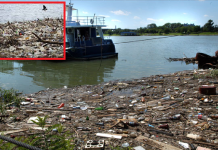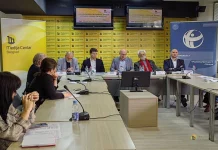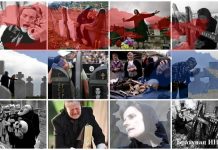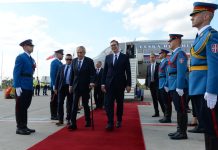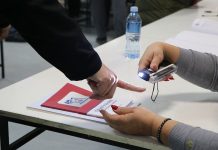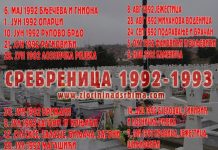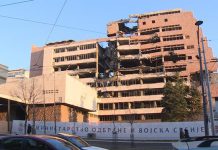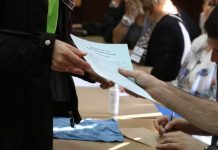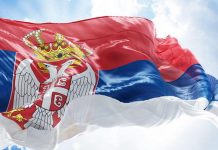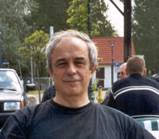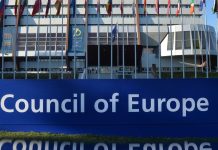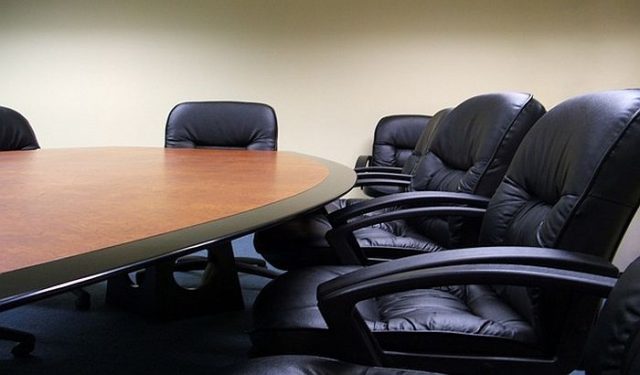 Nedavno, iz Haga je stigla vest da gospodin Vojislav Šešelj mora da se vrati u haški zatvor institucije koja sebe naziva ICTY. Prema rezoluciji Ujedinjenih nacija 37/194, o “Medicinskoj etici”, usvojenoj na Generalnoj skupštini 1982. godine, gospodin Vojislav Šešelj se ne može vratiti u zatvor već se lečenje mora nastaviti u odgovarajućoj medicinskoj ustanovi koja mu obezbeđuje “istu terapiju” kao ostalim pacijentima koji boluju od takve ili slične bolesti. U načelu, maksimalna/optimalna medicinska nega NIJE MOGUĆA u haškom zatvoru.
Nedavno, iz Haga je stigla vest da gospodin Vojislav Šešelj mora da se vrati u haški zatvor institucije koja sebe naziva ICTY. Prema rezoluciji Ujedinjenih nacija 37/194, o “Medicinskoj etici”, usvojenoj na Generalnoj skupštini 1982. godine, gospodin Vojislav Šešelj se ne može vratiti u zatvor već se lečenje mora nastaviti u odgovarajućoj medicinskoj ustanovi koja mu obezbeđuje “istu terapiju” kao ostalim pacijentima koji boluju od takve ili slične bolesti. U načelu, maksimalna/optimalna medicinska nega NIJE MOGUĆA u haškom zatvoru.
“Anex” rezolucije UN 37/194 iz 1982, Princip 1, precizira: “Zdravstveno osoblje posebno lekari koji su zaduženi za negu zatvorenika i pritvorenih, dužni su da obezbede zaštitu njihovog fizičkog i mentalnog zdravlja i pruže terapiju bolesti istog kvaliteta i standard kaji se obezbeđuje osobama koje nisu zatvorenici ili pritvoreni.”
Principle 6 insistira da se nabrojani principi moraju poštovati u potpunosti i u svim okolnostima. (United Nations, The General Assembly, Principles of Medical Ethics, A/RES/37/194: Resolution 37/194, 111th plenary meeting, 18 December 1982).
Rezolucija se može naći ovde:
Office of the High Commissioner for Human Rights (OHCHR)
http://www.ohchr.org/EN/ProfessionalInterest/Pages/TreatmentOfPrisoners.aspx
Pomenuta institucija («sud» u Hagu) koja zahteva povratak gospodina Šešelja verovatno u načelu može, ali tehnički je dosta teško, da obezbedi odgovarajuće lečenje u Hagu. Svakako, ne samo da je praktičnije da se Šešelj leči u Srbiji. Rizik postoji, što i iskustvo s ranijim zatvorenicima pokazuje, od kojih je više preminulo u Hagu pod sumnjivim okolnostima, da to lečenje u Hagu neće biti adekvatno. U načelu se ovakva predviđena terapija ne može i ne sme sprovoditi van specijalizovane medicinske ustanove. S toga bi gospodin Šešelj morao da ostane u Srbiji i da bez odlaganja počne sa terapijom.
U međuvremenu, treba uložiti žalbu OHCHR: Office of the United Nations High Commissioner for Human Rights (OHCHR) Palais Wilson, 52 rue des Pâquis, CH-1201 Geneva, Switzerland. http://www.un.org/documents/ga/res/37/a37r194.htm
Ovaj pokušaj vraćanja gospodina Šešelja u haški zatvor je kršenja ljudskih prava od strane ICTY i treba da označi kraj ovog ilegalnog suda.
Naši mediji, na primer „Politika“, izgleda NIKAD nisu komentarisali tu rezoluciju UN. Ako jesu, radovalo bi me. Ali to treba ipak sad PONOVO uraditi – iz očiglednih razloga.
Takođe, Ivan Janković, u svojoj knjizi «Zabrana zlostavljanja, priručnik za policiju i zatvorsko osoblje», Beogradski centar za ljudska prava, 2010, mada površno, diskutuje taj aspekt zdravstvene zaštite zatvorenika (!!), ne spominje neke važne aspekte koji su potencirani u rezoluciji 37/194, kao recimo Principle 1 i Principle 6 iz anexa. Prvi Princip sam ja citirao gore. Principle 6 potencira da se navedeni principi NIKAKO ne mogu zanemarivati čak ni u nekim hitnim situacijama. To je sad neobično važno.
Dr Dragan Pavlović
ANNEX rezolucije UN 37/194 iz 1982
Principles of Medical Ethics relevant to the role of health personnel, particularly physicians, in the protection of prisoners and detainees against torture, and other cruel, inhuman or degrading treatment or punishment
Principle 1
Health personnel, particularly physicians, charged with the medical care of prisoners and detainees, have a duty to provide them with protection of their physical and mental health and treatment of disease of the same quality and standard as is afforded to those who are not imprisoned or detained.
Principle 2
It is a gross contravention of medical ethics, as well as an offence under applicable international instruments, for health personnel, particularly physicians, to engage, actively or passively, in acts which constitute participation in, complicity in, incitement to or attempts to commit torture or other cruel, inhuman or degrading treatment or punishment.
Principle 3
It is a contravention of medical ethics for health personnel, particularly physicians, to be involved in any professional relationship with prisoners or detainees the purpose of which is not solely to evaluate, protect or improve their physical and mental health.
Principle 4
It is a contravention of medical ethics for health personnel, particularly physicians:
To apply their knowledge and skills in order to assist in the interrogation of prisoners and detainees in a manner that may adversely affect the physical or mental health or condition of such prisoners or detainees and which is not in accordance with the relevant international instruments;
“1. For the purpose of this Declaration, torture means any act by which severe pain or suffering, whether physical or mental, is intentionally inflicted by or at the instigation of a public official on a person for such purposes as obtaining from him or a third person information or confession, punishing him for an act he has committed or is suspected of having committed, or intimidating him or other persons. It does not include pain or suffering arising only from, inherent in or incidental to, lawful sanctions to the extent consistent with the Standard Minimum Rules for the Treatment of Prisoners.
“2. Torture constitutes an aggravated and deliberate form of cruel, inhuman or degrading treatment or punishment.”
Article 7 of the Declaration states:
“Each State shall ensure that all acts of torture as defined in article 1 are offences under its criminal law. The same shall apply in regard to acts which constitute participation in, complicity in, incitement to or an attempt to commit torture.”
(b) To certify, or to participate in the certification of, the fitness of prisoners or detainees for any form of treatment or punishment that may adversely affect their physical or mental health and which is not in accordance with the relevant international instruments, or to participate in any way in the infliction of any such treatment or punishment which is not in accordance with the relevant international instruments.
Principle 5
It is a contravention of medical ethics for health personnel, particularly physicians, to participate in any procedure for restraining a prisoner or detainee unless such a procedure is determined in accordance with purely medical criteria as being necessary for the protection of the physical or mental health or the safety of the prisoner or detainee himself, of his fellow prisoners or detainees, or of his guardians, and it presents no hazard to his physical or mental health.
Principle 6
There may be no derogation from the foregoing principles on any ground whatsoever, including public emergency.



